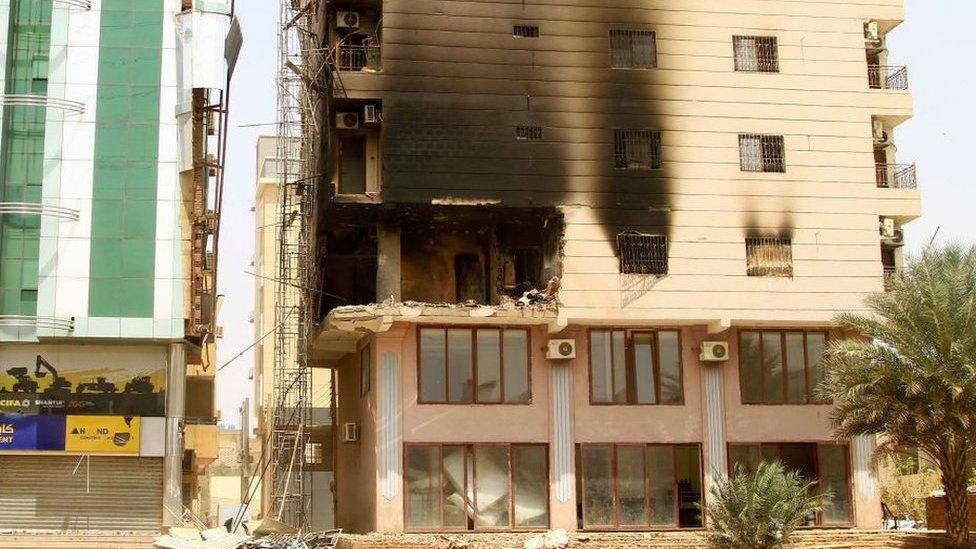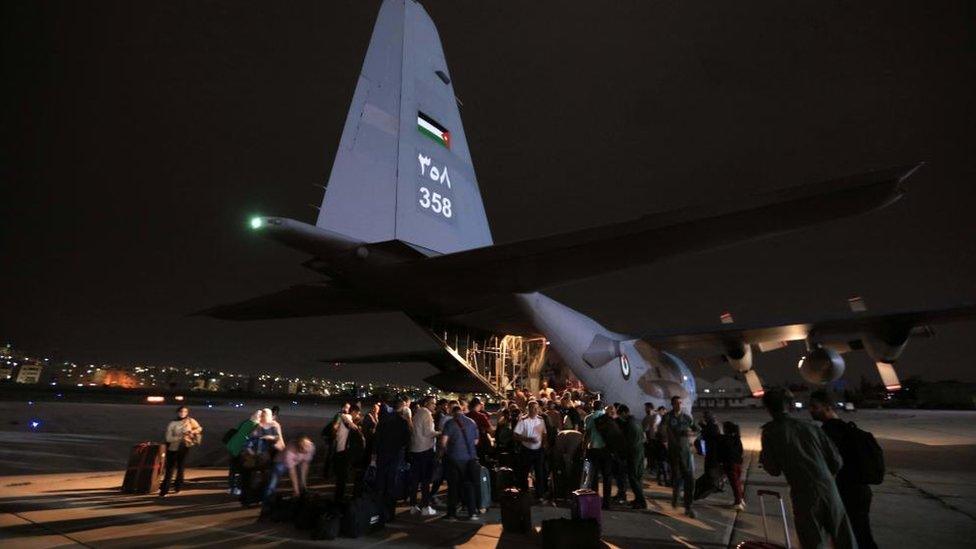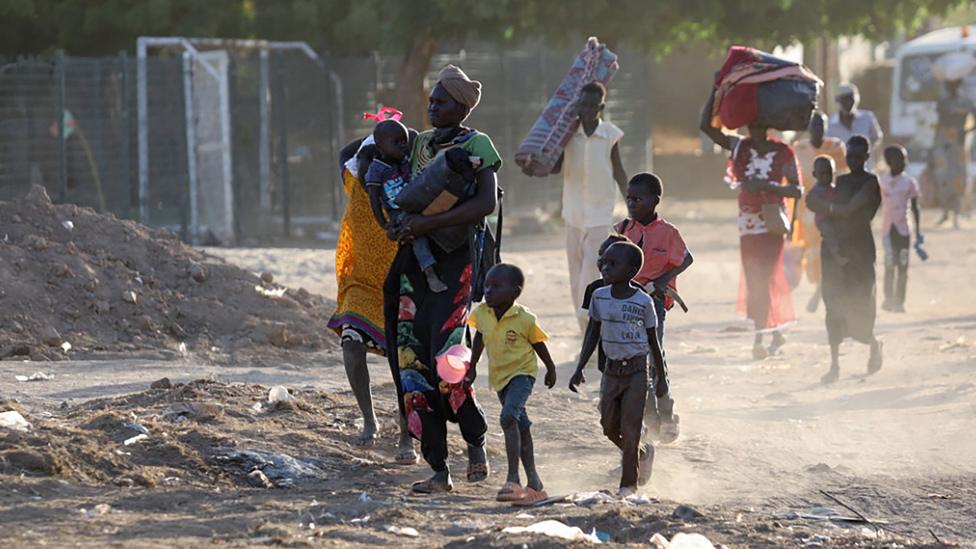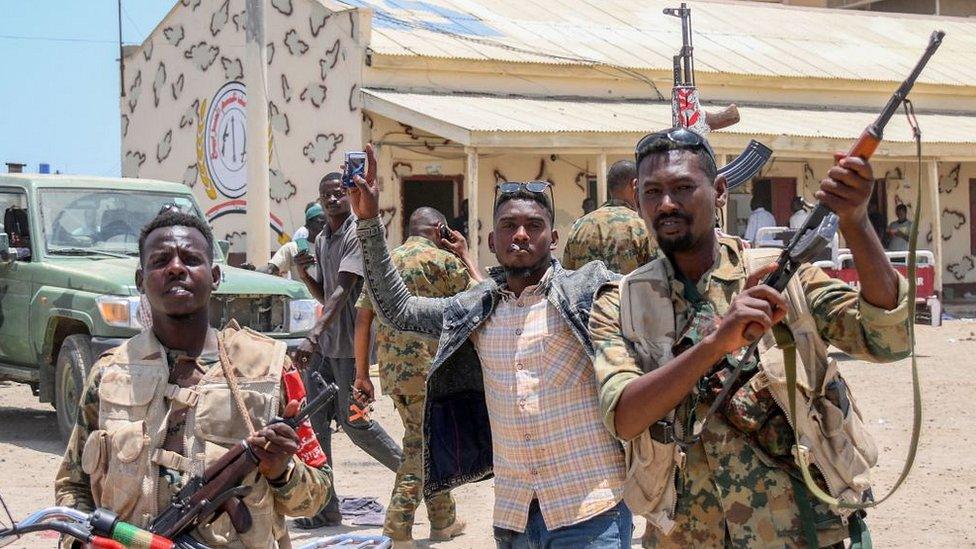Sudan violence: UK insists contact continues with trapped Britons
- Published

These buildings were damaged in the southern part of Khartoum during the escalating violence
The government insists it is in touch with Britons still stuck in Sudan after an evacuation operation only rescued UK diplomats and their families.
Minister Andrew Mitchell said 2,000 UK nationals had registered for help, but there could be up to 4,000 in Sudan.
The diplomats, who were flown out on Sunday, had been in a terrible position surrounded by fighting, he added.
Violence in Sudan between two opposing forces has seen deadly shooting and shelling in the capital, Khartoum.
Foreign Secretary James Cleverly has warned help for UK nationals remains "limited" until a ceasefire is reached - as some said they felt abandoned by the UK government.
Alicia Kearns, Conservative MP and chair of the foreign affairs select committee, said Britons stuck in Sudan were living in "abject fear" and the lack of contact with them suggested "no lessons have been learnt since Afghanistan".
The power struggle that erupted last week between Sudan's regular army and a paramilitary group called the Rapid Support Forces (RSF) has also affected other parts of the country, leading to a growing humanitarian crisis.
Electricity is scarce and food and water supplies are running out for many.
UNSUNG HEROES: How food and medicines are being delivered
SIMPLE GUIDE: What is going on in Sudan?
Sam, a British businessman living in Sudan, told the BBC on Sunday that news of the UK evacuation at the weekend "gave us hope, but in the absence of any information from the government this was clearly a solution for diplomats only".
He described the situation as a "nightmare for those of us left behind", and said he knew of many people from other countries such as Hungary and South Africa whose embassies were making plans to evacuate nationals.
'Dicey situation'
Another UK citizen in Sudan, William, opted to leave Khartoum on a bus organised by his Sudanese employer, taking him and other British nationals to neighbouring Egypt.
Speaking to the BBC's Newshour programme on Sunday evening, he said the UK government had given him no support, adding: "We had to basically go private, we've had absolutely nothing but nonsense from the government, and not even nonsense. We've had nothing."
William described waiting to be collected by the bus as a "dicey situation" with "gunfire going off all the time".
Amar, who lives in Edinburgh, has been visiting family in Omdurman which is about 15 miles north of Sudan's capital. Speaking to the BBC on Sunday, he said he did what the Foreign Office recommended but has not heard back.
"It's getting worse by the minute", he said, explaining that he is considering whether to evacuate by road to Egypt.
Describing the situation as traumatising, Amar's wife Fatima added: "It's getting worse - the clashes, the fighting, and there are dead bodies everywhere."
"Everyone is trying to escape and flee the country and you can see the country is really getting into a civil war and in the middle of all this you don't get any kind of support."
Watch: Leaving Sudan amid gunfire
Over the weekend, the prime minister confirmed that diplomats and their families had been evacuated in a "complex and rapid" operation.
It is understood UK special forces troops landed in Khartoum with a US evacuation team on Saturday.
Military vehicles were then used to collect UK embassy staff and their families, before they were airlifted to Cyprus on Sunday morning.
The British army, Royal Navy and Royal Air Force were involved in the rescue, with C-130 Hercules and Airbus A400M transport aircraft used, Defence Secretary Ben Wallace told BBC News.
Defence minister James Heappey said the embassy rescue mission "went without a hitch" despite its complexity - but that the "job isn't done".
The Ministry of Defence is working on options to support British nationals in Sudan which will be presented to the prime minister, he said.
The situation on the ground is at times "extremely dangerous" and the "window in which the environment is permissive is rarely long enough in which to do the military options," he said.
Briefing defence journalists, Mr Heappey admitted the UK had been caught out by the rapid deterioration in Sudan, adding: "It is fair to say that nobody in the UK government nor really in the wider international community saw fighting of this ferocity breaking out in the way that it did".
'Stay indoors'
Speaking to BBC Radio 4's Today programme, Mr Mitchell said British Embassy staff had been between the lines of fighting and in "very great danger" - with one official held at gun point.
The government had a "specific duty of care" to diplomats evacuated from Sudan, he added.
Mr Mitchell said a civilian evacuation had not been feasible on the weekend, but insisted "we are exploring every possible opportunity to get our citizens out".
He called for a ceasefire in Sudan, and urged Britons to follow government advice to "stay indoors".
UK citizens in Sudan are also being asked to tell the Foreign Office where they are in case more help becomes available, with a hotline in place for those who need urgent help, external.
Mr Mitchell said about 2,000 people had registered for assistance, with that figure rising over the last two days.
He insisted electronic messages from the UK emergency team were being sent every day, but explained they might not always arrive.
Watch: British diplomats evacuated after specific threats in Sudan - UK Foreign Secretary
Meanwhile, Ms Kearns said evacuations were proving enormously difficult "but we have to get our people out".
Asked on the Today programme about a person who claimed they had only received two text messages from the government, Ms Kearns said: "So that would suggest that no lessons have been learned since Afghanistan, and I have urged the government to make sure they are communicating regularly with British nationals."
However, Downing Street said "significant lessons" had been learned from the evacuation of Afghanistan in 2021 - which at the time was criticised as chaotic.
The prime minister's spokesperson also said the government would "pull every leaver possible" to help Britons in Sudan and to bring about a ceasefire.
Mr Sunak and Egyptian President Abdel Fattah al-Sisi agreed on Sunday that the UK and Egypt would work with international partners on diplomatic efforts to secure one.
A further Cobra meeting - an emergency response committee made up of ministers, civil servants and others - is expected later to discuss Sudan's "escalation" of violence.
Several other countries including the US, France, Germany, Italy and Spain have been evacuating their diplomats and citizens.

How have you been affected by what's happening in Sudan? You can get in touch by emailing haveyoursay@bbc.co.uk, external.
Please include a contact number if you are willing to speak to a BBC journalist. You can also get in touch in the following ways:
WhatsApp: +44 7756 165803, external
Tweet: @BBC_HaveYourSay, external
Or fill out the form below
Please read our terms & conditions and privacy policy
If you are reading this page and can't see the form you will need to visit the mobile version of the BBC website to submit your question or comment or you can email us at HaveYourSay@bbc.co.uk, external. Please include your name, age and location with any submission.

Related topics
- Published24 April 2023

- Published22 April 2023

- Published24 April 2023

- Published24 April 2023

- Published20 April 2023
